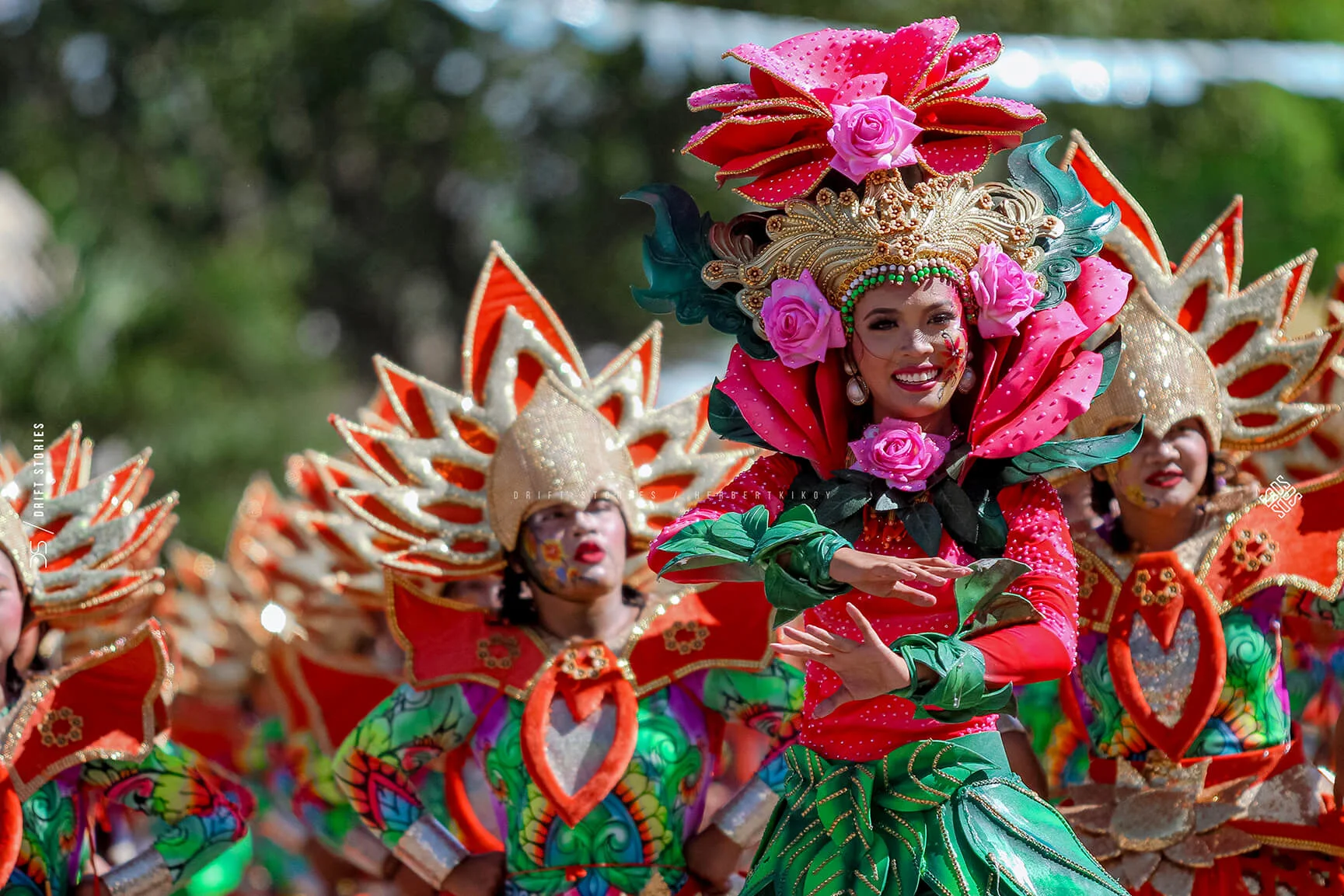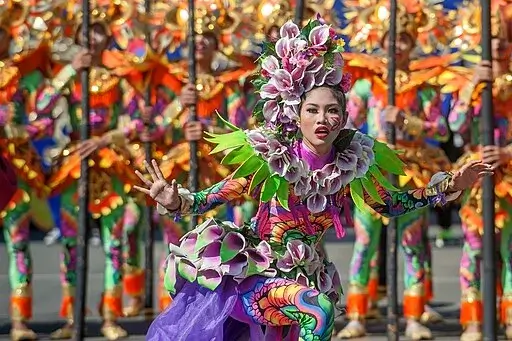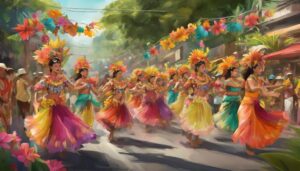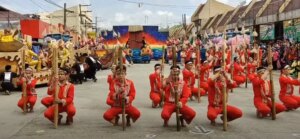
Image Source: Drift Stories
Welcome to the vibrant and captivating Pintaflores Festival in San Carlos City, Negros Occidental! If you’re looking for a unique and exhilarating cultural experience, you’ve come to the right place.
This festival is known for its painted flowers, dance competition, and intricate flower tattoos that adorn the locals. San Carlos City comes alive with street pageantry and a vibrant cultural fusion that will leave you in awe.
Get ready to learn about the deep-rooted traditions of the Negros Occidental region and immerse yourself in the rich history and heritage of this captivating festival.
Facts About The Pintaflores Festival Philippines
| Facts | Explanation |
|---|---|
| Name of the Festival | Pintaflores Festival |
| Type of Festival | Cultural and religious celebration |
| Festival Etymology | “Pinta” meaning paint, and “Flores” meaning flowers, reflecting the festival’s focus on floral motifs and vibrant colors |
| Brief History of the Festival | The Pintaflores Festival originated from the ancient tradition of offering flowers to the patron saint, San Carlos Borromeo. Over time, it has evolved into a colorful celebration that showcases the unique culture and traditions of the region. |
| Brief History of the City | San Carlos City is a progressive urban center with a rich agricultural heritage. It has a vibrant community known for its warm hospitality and strong cultural identity. |
| Ethnic Information | The festival highlights the cultural heritage of the Negrenses, particularly the indigenous traditions of the region. |
| Location of the City in the Country | San Carlos City is located in the province of Negros Occidental in the Western Visayas region of the Philippines. |
| How to Reach the City | San Carlos City can be reached by land via bus or private vehicle from major cities such as Bacolod and Cebu. |
| Nearby and Surrounding Cities or Towns | – Bacolod City: Approximately 89 kilometers from San Carlos City – Cebu City: Accessible via ferry from San Carlos City |
| Google Map Link to the City Location | San Carlos City Map |
| Festival Main Events and Activities | – Street dancing and parade featuring floral-themed costumes and choreography – Religious processions and rituals honoring San Carlos Borromeo |
| Other Famous Tourist Attractions | – Sipaway Island: A nearby island known for its pristine beaches and diving spots – San Carlos City Museum: Showcasing local history and artifacts |
| Famous Food Dishes of the City | – Inasal na Manok: Grilled chicken marinated in local spices – Piaya: Sweet flatbread filled with muscovado sugar and sesame seeds |
| Landmarks in the City and Why They are Famous | – Fort San Pedro: A historical fort that played a significant role in the city’s defense – San Carlos Borromeo Cathedral: A prominent Catholic church with architectural significance |
| Related Festivals in the Same Region | – Sinulog Festival in Cebu City: A grand celebration featuring street dancing and religious processions – MassKara Festival in Bacolod City: Known for its colorful masks and lively street parties |
Why Pintaflores Festival San Carlos City is Celeberated?
The Pintaflores Festival in San Carlos City, Negros Occidental, is celebrated annually to commemorate the city’s rich history and cultural heritage. The festival fuses elements of nature and art, combining the Spanish words “pinta” (meaning paint or tattoo) and “flores” (meaning flowers).
The central narrative of the festival revolves around Princess Nabingka, who sought new lands during the Spanish colonial period and eventually founded the city that is now San Carlos. When she fell ill, the local people turned to flower gardens as a cure, and when flowers failed to flourish, they resorted to using floral tattoos instead.
This practice continues today as a tribute to Princess Nabingka’s recovery and the city’s foundation. The festival features colorful street dances, intricate floral tattoos, and traditional costumes, providing visitors with a vivid display of the region’s cultural identity.
Painted Flowers: The Symbolism and Artistry
The Pintaflores Festival in San Carlos City, Negros Occidental, Philippines is a vibrant and colorful celebration that brings together the beauty of painted flowers, dance competitions, and cultural fusion.
The festival is known for its stunning street pageantry, showcasing the intricate artistry of floral motifs that adorn the participants’ costumes and adornments.
The painted flowers play a significant role in the festival, symbolizing the bountiful harvest, the rich cultural heritage, and the artistic prowess of the local community.
Origin of Floral Imagery in the Festival
The Pintaflores Festival is celebrated in San Carlos City, Negros Occidental to commemorate the founding of the city and honor its rich history and culture.
The festival’s name, derived from the Spanish words “Pinta” (tattoos) and “Flores” (flowers), reflects the combination of emotions and nature that make it a unique and beautiful event.
The festival’s origins date back to the early years of San Carlos City during the Spanish colonial period. According to legend, Princess Nabingka, a well-known figure for her beauty and wit, journeyed from Cebu to the neighboring island that is now San Carlos City.
When she fell ill, a local healer advised her people to cultivate flowers as a remedy. When the villagers followed this advice and painted flowers on their bodies, she recovered, and the community celebrated with cheers and dances.
This tradition evolved into the Pintaflores Festival, where dancers represent Princess Nabingka by wearing floral costumes and painting their bodies with flowers. The festival showcases street dancing, ritual competitions, and dance dramas that depict themes of gratitude, blessings, prosperity, life and death, and the triumph of good over evil.
By celebrating the Pintaflores Festival, San Carlos City pays homage to its rich socioeconomic heritage, showcases its cultural identity, and attracts both locals and tourists alike. It is a visually stunning event that combines history, mythology, and the vibrant beauty of flowers, making it a must-see festival in Negros Occidental.
The Pintaflores Festival is celebrated to honor the founding of San Carlos City, showcasing its history, culture, and the captivating narrative of Princess Nabingka. It is a vibrant and enchanting event that highlights the city’s charm and attracts visitors from far and wide.
Techniques and Meanings Behind Flower Tattoos
The flower tattoos seen during the Pintaflores Festival are not just beautiful decorations; they also hold deep cultural and symbolic meanings.
The intricate designs are created using traditional tattooing techniques that have been passed down through generations. Each flower carries its significance, with bold colors and intricate patterns symbolizing prosperity, fertility, and the vibrant spirit of the community.
The use of flower tattoos during the festival is a powerful expression of identity and a celebration of the interconnectedness between nature and culture.
Dance Competition: The Heartbeat of the Celebration
The dance competition is the core of the Pintaflores Festival in San Carlos City, Negros Occidental. It showcases the energy and passion of the locals, as well as their creativity and skill in traditional and modern dance forms. The competition is a highlight of the festival, drawing participants and spectators from all over the region.
Structure and Organization of the Dance Events
The dance competition is meticulously organized, with different categories for various age groups and dance styles. Each group undergoes rigorous training and rehearsals to deliver top-notch performances.
The event is held in a large, open space to accommodate the crowd and allow the performers to demonstrate their moves with ease.
As a spectator, you can expect a well-structured and seamless flow of performances that will keep you captivated throughout the event.
Notable Dance Groups and Performances
Some of the most notable dance groups in the region participate in the Pintaflores Festival dance competition.
These groups bring their A-game, showcasing intricate choreography, vibrant costumes, and high-energy performances that will leave you in awe. From traditional folk dances to contemporary routines, you will witness a rich tapestry of cultural fusion and artistic expression.
The talent and dedication of the performers are truly commendable, and you will undoubtedly be inspired by their passion for their craft.
Street Pageantry: A Parade of Culture and Creativity

The Street Pageantry at the Pintaflores Festival in San Carlos City is a showcase of vibrant culture and creative expression. The streets come alive with a dazzling parade that mesmerizes everyone with its colorful and energetic display.
The Role and Elements of the Street Pageant
During the Street Pageantry, you will witness different elements that play a vital role in showcasing the rich culture of San Carlos City and Negros Occidental.
The street pageant typically includes traditional dances, intricate flower-themed costumes, and elaborate floats that depict the history and heritage of the region.
Each element represents the pride and identity of the community, and the performances convey stories and traditions passed down through generations.
Fusion of Traditional and Contemporary Motifs
One of the most captivating aspects of the Street Pageantry is the fusion of traditional and contemporary motifs. You will see how the dancers and performers seamlessly blend ancient rituals and customs with modern influences, creating a dynamic and visually stunning spectacle.
The incorporation of traditional music, dance, and attire with modern choreography and innovative concepts showcases the evolution of the festival, while still preserving its cultural roots.
Pintaflores within Negros Occidental
However, Negros Occidental is more than just a province in the Philippines. It is home to the vibrant and colorful Pintaflores Festival, which is celebrated in San Carlos City. The festival is a testament to the rich cultural heritage and artistic talent that can be found within the province.
San Carlos City as a Cultural Hub
If you’re visiting Negros Occidental, you can’t miss the opportunity to experience the cultural hub of San Carlos City.
The city is known for its lively and energetic atmosphere, especially during the Pintaflores Festival. You can immerse yourself in the local arts, music, and cuisine, and witness firsthand the passion and creativity of the people.
Contributions to the Identity of Negros Occidental
The Pintaflores Festival has made significant contributions to the identity of Negros Occidental.
It has helped showcase the province’s unique traditions, including the intricate art of flower tattoos and the mesmerizing dance competition. Through the festival, you get a glimpse of the rich history and cultural fusion that define Negros Occidental.
By incorporating these significant details, you have showcased the festival as an important part of the identity of Negros Occidental. However, keep in mind that certain dangerous elements can be present, and it is important to be mindful of the local customs and traditions.
Less Known Facts About The Pintaflores Festival
Here are ten interesting and perhaps less widely known facts about this colorful festival:
- 🌺 The festival’s name, Pintaflores, combines “pinta” (paint) and “flores” (flowers), reflecting the event’s emphasis on body painting and the use of flowers in its celebrations.
- 📅 It is held annually from November 3 to 5, coinciding with the city’s charter anniversary, turning the city into a lively and vibrant spectacle.
- 🎨 The festival was inspired by the Nabingkalan Tattoo Festival and the local legend of Princess Nabingka, who had her body covered in tattoos to escape the advances of a suitor, which is echoed in the body painting traditions of Pintaflores.
- 🌼 Participants in the festival are painted with floral designs, symbolizing the beauty and resilience of the city’s people, and their deep connection to nature.
- 💃 The festival features a street dancing competition, where dancers adorned in floral costumes perform routines that tell stories of their heritage and local folklore.
- 🏆 The Pintaflores Festival has gained national recognition, being featuredin various tourism promotions and cultural showcases across the Philippines.
- 🌱 Environmental consciousness is part of the festival’s theme, with efforts to use eco-friendly materials for costumes and decorations, reflecting the community’s awareness of sustainability.
- 🎭 Each year, the festival adopts a different theme, allowing for a fresh and innovative approach to its celebrations, while still honoring the traditions and stories of San Carlos City.
- 🌟 The festival is not just a celebration of dance and art, but also includes sports events, agricultural shows, and other community activities, making it a comprehensive cultural event.
- 🍴 Local delicacies and cuisine are highlighted during the festival, offering visitors a taste of Negros Occidental’s rich culinary traditions, with street food stalls and local restaurants participating actively in the festivities.
Summary Of Pintaflores Festival
| Fact | Link |
|---|---|
| Festival name | Pintaflores Festival |
| Location | San Carlos, Negros Occidental, Philippines |
| Date | November 5th |
| Meaning of the festival name | Derived from the Spanish words ‘pinta’ (tattoos) and ‘flores’ (flowers) |
| Theme | Fusion of arts and nature |
| Storyline | Involves the adversity and victory of Princess Nabingka |
| Legend | Princess Nabingka traveled from Cebu City to an island, which is now San Carlos City |
| Tradition | Floral tattoos were used for the princess’ healing |
| Festival highlights | Intricate floral tattoos of the dancers |
| Cultural significance | Offers a glimpse into the rich cultural heritage of the city |
| Tourist attraction | Popular tourist attraction |
| Derived from the Spanish words ‘pinta’ (tattoos) and ‘Flores’ (flowers) | History of Pintaflores Festival |
| Spanish colonization period | Spaniards colonized the Philippines for over 300 years |
| Princess Nabingka | Festival History |
| Former name of San Carlos City | Nabingkalan |
| Princess’ illness | She got seriously ill and sought healing through flowers |
| Celebration of regained health | People wearing colorful and flowery gowns |
| Innovation in celebration | The beautiful and famous princess who visited San Carlos City |
| Other festivals in Negros Occidental | Balay Negrense and Masskara Festival |
Related References To Pintaflores Festival
| Reference | Link |
|---|---|
| Pintaflores Festival Overview | Link |
| San Carlos City, Negros Occidental | Link |
| Spanish colonization of the Philippines | Link |
| Princess Nabingka and the festival’s origin | Link |
| Babaylan (Filipino folk healers) | Link |
| Balay Negrense (another festival in Negros Occidental) | Link |
| Masskara Festival (another festival in Negros Occidental) | Link |
Please note that the provided links are for reference purposes only and should be visited at your discretion.
History of San Carlos City, Negros Occidental
San Carlos City, located in Negros Occidental, Philippines,has a rich history that dates back to when it was a small Negrito community known as Nabingkalan.
The transition from a community to a recognized municipality occurred in 1856 when the Spanish government renamed it San Carlos and established it as a pueblo. This development was part of the colonial strategy to organize and manage local populations more effectively. The city’s spiritual foundation was laid in 1892 with the appointment of its first parish priest by the Bishop of Jaro, signifying the establishment of organized religion and governance in the area.
The municipality’s transformation into a city on July 1, 1960, marked a significant milestone in its development, reflecting its growth and the accumulation of its historical and cultural heritage. The city’s name honors San Carlos Borromeo, reflecting the deep-rooted influence of Spanish colonialism and Catholicism in the area’s history and identity.
This historical progression from a small settlement to a bustling city encapsulates the cultural and societal evolution of San Carlos, highlighting its importance within the Negros Occidental region and the broader narrative of the Philippines.
References:
Conclusion
The Pintaflores Festival in Negros Occidental’s San Carlos City is a lively and captivating event that highlights street dances, flower costumes, and traditional rituals.
It takes its name from the words “Pinta” and “Flores,” symbolizing the city’s origin story and the victory of good over evil.
This visually spectacular festival draws in tourists with its vibrant processions, rhythmic dances, and delectable local cuisine. It is a must-see event to immerse oneself in the rich cultural heritage and traditions of San Carlos City.
Frequently Asked Questions
What is the Pintaflores Festival?
The Pintaflores Festival is an annual event celebrated in San Carlos City, Negros Occidental, every November. It combines the themes of flowers (flores) and tattoos (pinta), showcasing street dancing, colorful costumes, and body-painted dancers in a vibrant cultural celebration.
When is the Pintaflores Festival held?
It is held every year in November, with specific events and activities planned around this time to celebrate the festival’s rich cultural significance and tradition.
What are the main attractions of the Pintaflores Festival?
Main attractions include street dancing competitions, ritual competitions, and the display of elaborate costumes and body paint that reflect the festival’s unique blend of floral and tattoo artistry.
Why is the Pintaflores Festival celebrated?
The festival is celebrated to honor the city’s patron saint, San Carlos Borromeo, and to commemorate the historical and cultural heritage of San Carlos City. It symbolizes the beauty, resilience, and vibrant spirit of the local community, blending historical traditions with contemporary festivities.







